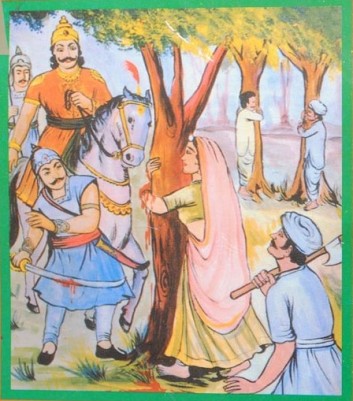This is a dedication to the #Bishnois of Rajasthan who are the most fierce and dedicated environmentalists in our country, probably in the world. They gather every September to commemorate this great sacrifice which took the lives of nearly four hundred Bishnois.
Story of a Paradise
It was a place where sadness was rarely experienced. For, in life, health was taken care of by the very lightness of the soul. Inevitable death too was celebrated enabling one to see the reflected truth of life’s happiness. But death that was evitable was hard to understand, digest, accept.
Paradise Lost
One of his generals with his troop of men, travelling west and, having heard about the little jewel of the desert, went about trying to find it. They set about in the direction of the village, judging lightly the atrocities of the western-desert climate. Ere long they had exhausted their supplies and had no water to drink. By night they traveled and rested in their tents under some palm trees during the day. Cactus juices and water from camel humps were precious supplies. Many a man fell ill; a few died of exhaustion and hunger and more of thirst and dehydration. The general, determined, moved on with the remainder of his men. After a few days’ journey through the desert, weary and exhausted, the men reached the little village.
Now that their health was restored, their regular memory and attitude returned back. The general soon organized his men and got them set to cut down choice trees to take back to his king.
Coming to know of this, the villagers rushed to where the general and his men were. “O respected sire! We salute you humbly. We plead with you to have mercy on these trees and also on all the creatures that need them. We beg you; do not cut them down. We shall serve you with pleasure to the best of our ability in any other way. Noble sir, please do spare these trees!” beseeched the villagers.
As another man raised his axe, a second woman went and clung to it. It was her tree. She had climbed it when she was young and had earned the nickname ‘monkey’. How many berries she had picked form it! This tree was as much her friend as any other girl was in the village!
When the third one raised his axe facing a tree, yet another woman hugged it. It was behind this tree that she used to hide when she played with her friends. She remembered that her pet peacock loved to roost on this tree! She would never let go of this very own tree of hers!
And so, one by one, every tree that had an axe facing it had a woman to hold on to it. Several scores of women held on to the trees. The axe-men, at a loss, knew not what to do. They looked questioningly at the general.
The general simply said in his loud and clear commanding voice, “Chop down anyone who opposes the king!”

Having come on a mission, the general and his men now had wood which they could not collect. They simply turned back to report the unexpected turn of events to the king. The others in the village watched on helplessly as the sky came crashing on their heads.
A few days passed. Nothing was cooked or eaten in the meanwhile. Children were beginning to starve for want of their parents, siblings, friends and food. Life had to begin again and so it did. Neighbours adopted parent-less children. Soft, comforting words were spoken. Slowly life moved on – sober, gloomy, sad.
And so the village began its work. They planted trees for all the dead children, men and women. They nurtured them well, watering, manuring and talking to them. The grove slowly but happily grew back. There were children running around now. There were plays and fun happening in the grove. The elders began smiling again. Squirrels and rabbits and deer and peacocks played around. The cuckoos sang and the monkeys played their funny games. The paradise came around all the more beautifully for everybody knew its worth all the more now. This paradise too once was their very own hell!
***
The king of Jodhpur, upon hearing the details, stopped felling of trees thenceforth.
Amrita Devi was the first woman who, along with her three little daughters, defied the king’s men and clung to the trees. The villagers soon followed her. This was the beginning of the Chipko Movement.
A total of 363 people lost their lives in the incident.
Amrita Devi Smriti Award was instituted by the Government of Rajasthan for exemplary service to protect the environment.

Captivating narrative of the origin of a great movement!
LikeLike
It was perhaps one of its kind on earth at the time! Thank you for the sweet words 🙂
LikeLike
Very much moved. Thank you
LikeLike
Thank you very much 🙂
LikeLike